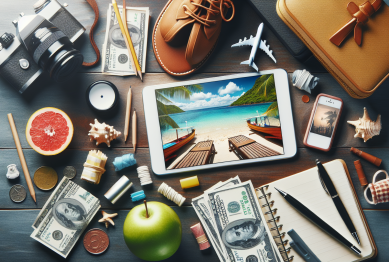Many travelers wonder about the real impact of travel on their personal development, finances, and well-being. Explore how world exploration can unlock new career skills, reshape perspectives, and enrich life in unexpected ways—well beyond typical vacation memories.
Travel Teaches Problem-Solving and Adaptability
Travel often requires adjusting plans at the last minute, dealing with language barriers, and navigating unfamiliar systems—all occasions to hone problem-solving skills. When encountering missed connections or unpredictable events, travelers learn to react quickly and find creative solutions. This flexibility becomes an asset even after returning home, as both employers and communities value adaptive thinkers. Everyday decisions, once daunting, often feel less stressful after navigating a foreign metro or confronting a travel mishap.
Adapting to diverse transportation systems or cultural etiquette prompts a reassessment of one’s comfort zone. Whether deciphering new currencies or planning routes in cities like Tokyo or Istanbul, travelers often emerge more resourceful. Studies from academic institutions find exposure to these challenges results in better cognitive resilience and a broader ability to embrace change (Source: NIH). As flexibility grows, so does confidence.
Learning from unfamiliar environments also sharpens observation. Visiting destinations with different safety standards, currencies, or social habits strengthens attention to detail. Tourists become more alert to surroundings, actively listening and observing behaviors. Such experiences can even foster skills relevant to high-demand careers, as employers increasingly seek candidates familiar with problem-solving in varied scenarios.
Personal Growth Happens Unexpectedly While Abroad
Many people associate personal growth with formal education or workplace training, but travel often acts as a catalyst for self-improvement. Immersing in new places naturally broadens perspectives and can reduce implicit bias. Encountering customs unlike one’s own challenges preconceived opinions. Studies indicate that even brief international stays positively impact open-mindedness and emotional intelligence (Source: NIH).
Overcoming travel anxieties—such as navigating unfamiliar airports or sampling unfamiliar food—builds inner strength. These micro-accomplishments offer psychological benefits that last long after the trip. Developing the ability to handle uncertainty paves the way for greater resilience in daily life, making setbacks seem less daunting.
Travel environments also cultivate patience and empathy. Waiting for public transit, sharing hostels, or interacting with non-English speakers fosters a more compassionate worldview. As research demonstrates, exposure to global cultures enhances individuals’ ability to relate to people from all walks of life (Pew Research Center).
Budget Travel Sparks Financial Creativity
Travel’s financial side challenges individuals to plan and manage budgets across currencies and cost-of-living differences. Mapping out a route or deciding between affordable hotels and local homestays encourages strategic thinking. Comparing options like public transportation, group tours, or self-catering develops practical budgeting skills, which translate to smarter daily money management at home.
Resourceful travelers find ways to stretch each dollar. Many make use of free walking tours, discount city passes, or local markets to experience destinations authentically while protecting their wallet. Research on travel spending shows that mindful planning results in rewarding trips without unnecessary expenses (Source: NerdWallet).
Managing finances abroad trains individuals to spot hidden costs, avoid tourist traps, and compare value across experiences. This not only supports responsible tourism but improves savvy spending habits for future goals, like continuing education or launching a side hustle. Learning to budget on the road can inspire savings strategies and enhance long-term financial health.
World Exploration Boosts Communication Skills
Travel puts communication skills to the test, especially in regions where one’s native language is not spoken. Relying on gestures, translation apps, and cultural etiquette becomes second nature. This skill set transfers to professional and personal interactions, enriching one’s ability to convey ideas with clarity regardless of context.
Active listening grows vital when directions or subtle cues differ from home. Encountering dialect variations or non-verbal communication shapes more effective messaging. For example, experiencing Mediterranean hospitality or the politeness of Japanese greetings teaches nuanced ways to express respect. These lessons translate into better relationships at home and work.
Multilingual exposure, even at a basic level, can stimulate new neural pathways. Learning phrases in Spanish, Mandarin, or French stimulates the brain and encourages lifelong learning. According to language experts, this boosts creativity and enhances memory (ACTFL).
Cultural Immersion Shapes Career and Life Choices
Immersing in cultures different from one’s own often leads to shifts in career objectives, interests, and priorities. Witnessing social practices and work environments down unfamiliar alleyways can inspire fresh ideas or future career pivots. Experiencing food security efforts in Southeast Asia or innovative transportation in Scandinavia often opens new dialogues about global responsibility and sustainability.
Many travelers discover untapped passions or new career interests while volunteering abroad or attending cultural festivals. Programs that facilitate volunteering, teaching, or cultural exchanges can introduce participants to alternative professions and networks (Source: GoAbroad). Such firsthand experiences make a significant impact on post-travel decision-making.
Networking opportunities abound, from international conferences to casual hostel conversations. An open itinerary often leads to unexpected meetings with entrepreneurs, artists, or changemakers. These moments can turn travel companions into lifelong friends or professional allies. For those who embrace them, travel expands not just the mind, but future possibilities, too.
Travel Supports Well-Being and Stress Relief
The mental health benefits of travel extend beyond scenic relaxation. Regular exploration of new places can reduce stress levels and boost life satisfaction. Leaving behind daily habits and gadgets encourages a renewed sense of presence and joy, as reflected in reports from veteran travelers and psychologists alike (Harvard).
Being outdoors—whether hiking a rainforest trail or strolling an historic city—improves physical health and mental equilibrium. Breathing fresh air, absorbing sunlight, and immersing in different environments recalibrates both mood and body. Even short trips have been linked to lower rates of depression and anxiety, with benefits lingering well after travel concludes.
Travel introduces healthier approaches to daily routines. Sampling Mediterranean diets abroad, adopting afternoon siestas, or trying new forms of exercise can inspire changes at home for improved wellness. Travel is not just an escape; it serves as a training ground for lifelong resilience and self-care.
References
1. Demirtaş-Madran, H. A., & Keleş, E. (2018). Adaptation to Travel-Related Stress and Flexible Coping Skills. Retrieved from https://www.ncbi.nlm.nih.gov/pmc/articles/PMC6062579/
2. Witmer, L., & Gatzke, K. (2020). How International Travel Shapes Emotional Intelligence. Retrieved from https://www.ncbi.nlm.nih.gov/pmc/articles/PMC7143836/
3. Pew Research Center. (2019). The Changing Face of World Traveling. Retrieved from https://www.pewresearch.org/short-reads/2019/11/13/the-changing-face-of-world-traveling/
4. American Council on the Teaching of Foreign Languages. (2022). Benefits of Learning Language While Traveling. Retrieved from https://www.actfl.org/resources/guiding-principles-language-learning
5. United Nations World Tourism Organization. (2020). Sustainable Development in Tourism. Retrieved from https://www.unwto.org/sustainable-development
6. Harvard University. (2021). Travel and Well-Being. Retrieved from https://www.harvard.edu/in-focus/travel-and-well-being/









